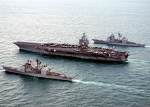Neocon Washington Think Tank: The US should Provoke Iran into “Firing the First Shot”

Patrick Clawson, Director of Research of the Washington Institute for Near East Policy suggests that the US should provoke Iran into taking the first shot.
“If the Iranians are not going to compromise, it may be best that somebody else start the war”.
“We can do a variety of things to increase the pressure”.
“We are in the game of using covert means against Iranians. We can get nastier at that.”
Patrick Clawson, who was a “progressive” political economist in the 1970s, heads the Washington Institute’s Iran Security Initiative. The latter “aims to generate critical analysis, private dialogue, public debate, and operational recommendations designed to address the many challenges posed by Iran.”
* * *
Recalling the war pretext incidents in US history, including the Lusitania (World War I) Pearl Harbor (Waorld War II) and the Gulf of Tonkin (Vietnam), Patrick Clawson’s “operational recommendation” is to incite an incident which will provoke Iran to firing the first shot, potentially leading us onto the path of World War Three.
According to Patrick Clawson and David Makovski, in a September 2012 Washington Institute publication:
At some point soon, … the window for diplomacy will indeed have closed, and the United States—along with as many international partners as it can mobilize—should move to more forceful action, be it covert or overt, publicly proclaimed or deniable. … Recognizing this reality, the U.S. government may decide that, in the absence of diplomatic progress, the best alternative is to create conditions under which Israel will attack, rather than to accept that the talks have failed; after all, failed talks would lead to much debate about whether the United States must act overtly and directly against Iran’s nuclear program. But such an approach would amount to placing quite a heavy burden on a small U.S. ally. Other countries relying on U.S. security would have to draw lessons about how much value to place in their U.S. security guarantees. (emphasis added)
Covert procedures to trigger a war pretext incident are an integral part of military planning.
Recent developments, including US-NATO war games and the deployment of a powerful naval armada in the Persian Gulf, `”create conditions” which favor a Gulf of Tonkin type incident, which in turn would provide a justification to waging an all out war on Iran.

